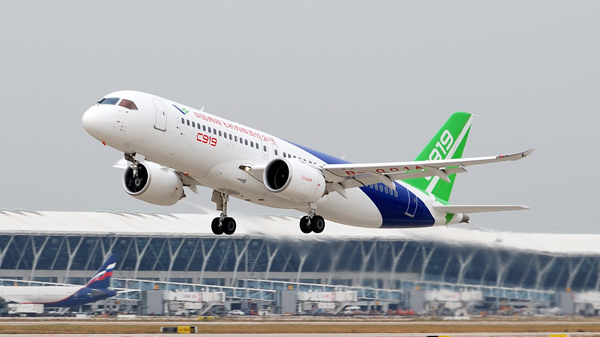Clear skies ahead for China's C919


First homegrown large passenger jet is waiting to pass international safety tests
Watching the C919 soar into the sky during its maiden flight in May simply underlined China's ambitious commercial aviation program.
The country's first domestically-built large passenger jet is a single-aisle model similar to the Boeing 737 and the Airbus 320.
With its elegant design and narrow-body airframe, the C919 is testament to the prowess of manufacturer Commercial Aircraft Corp of China, or COMAC for short.
But away from the runway razzmatazz, the real work has just begun to obtain the airworthiness approval in China and then from overseas markets.
"When we refer a nation with strong aviation power, first it needs to have large traffic volumes, then strong manufacturing abilities, and finally the aviation regulatory standards of a country should be widely recognized," said Lin Zhijie, an aviation industry analyst and columnist at Carnoc, China's leading civil aviation web portal.
Already the C919 has attracted 785 orders from 27 Chinese and international customers. But to expand its overseas sales, it will need to comply with stringent global safety regulations.
A new agreement with the United States has helped pave the way to meeting those standards.
In October, the Civil Aviation Administration of China, known as CAAC, and the US Federal Aviation Administration, or FAA, announced they would validate the regulatory standards of both countries.
The Implementation Procedures for Airworthiness, or IPA, will adopt the regulatory systems of both nations under the US-China Bilateral Aviation Safety Agreement, which was created in 2005.
This should help shorten the C919's review procedure in obtaining an airworthiness certificate by the FAA, although the aircraft still faces various other safety checks.
"Before, China did not have the ability to formulate its own regulatory standards and it used to mainly copy the regulations of the FAA," said Lin of Carnoc.
COMAC has called the agreement "a significant step" forward.
The aviation manufacturer pointed out the European Aviation Safety Agency, or EASA, is in the process of certifying the airliner under the China-European Union air safety agreement.
"The external environment for the C919 to get the airworthiness certificates from the US and Europe is getting better," said Wu Yue, an assistant to the general manager at COMAC.
The agreement with the FAA in the US has certainly set the tone.
It recognizes both countries' aviation products and will replace the accord hammered out in 1995.
"The Implementation Procedures for Airworthiness document allows each authority to leverage approvals completed by the other with respect to design, production and airworthiness, as well as continued airworthiness," the FAA said in a statement on its website.
"The agreement uses the compatibilities of the two authorities' certification systems, and fulfills the commitment that the US and China made in 2005 with the establishment of BASA (US-China Bilateral Aviation Safety Agreement)."
Xu Chaoqun, an official at the CAAC, stressed the new accord is thoroughly comprehensive and shows the world's second largest economy is now a global player in the civil aviation world.
During the next 20 years, domestic airlines are expected to purchase 7,240 aircraft valued at $1.1 trillion, a Boeing China Current Market Outlook report released in September highlighted.
By 2036, single-aisle jets will continue to serve as the workhorses of domestic and regional fleets in China, the world's fastest-growing aviation market.
"The country will have a demand for 5,420 new single-aisle airplanes, accounting for 75 percent of total new deliveries," the report stated.
China's fleet size growth is also expected to outpace the global average with almost 20 percent of new aircraft demand coming from airlines based in the country, according to Boeing.
In the next 20 years, Boeing is forecasting a need for more than 41,030 airplanes valued at about $6.1 trillion globally.
Naturally, Boeing has a strong presence in China.
The aviation giant signed a deal to deliver 300 single-aisle and twin-aisle aircraft during US President Donald Trump's state visit to China in November.
Worth more than $37 billion at list prices, the agreement between Boeing and China Aviation Suppliers Holding is made up of 260 B737s, and 40 B787s and B777s.
"China is a valued customer and key partner, and we are proud that Boeing airplanes will be a part of its fleet growth for years to come," said Kevin McAllister, president and CEO of Boeing Commercial Airplanes.
"Boeing and China have a strong history of working together based on great mutual respect, and these orders build on that foundation," he added.
Like its US rival, COMAC hopes to turn the C919 into an overseas money-spinner once it has navigated international safety regulations.
Li Xiaojin, professor of aviation economics at the Civil Aviation University of China in Tianjin, said the aircraft must first pass rigorous tests in China.
"In the short term, the C919 won't have much of an impact on major European and US aircraft manufacturers since it will take a very small market share," Li said.
"But in the long term, the jet has the potential to be exported to other countries," he added.
In the past few months, the C919 has taken off on multiple test flights.
The airliner completed its first long-haul run in early November from Shanghai to Xi'an in Shaanxi province. COMAC said it was another milestone entering its airworthiness certification phase.
"The C919 flew more than 1,300 kilometers, with a duration of 144 minutes, and the flying altitude was around 7,800 meters," the aircraft manufacturer stated.
As test flights continue, China Eastern Airlines has sent personnel to evaluate the cockpit and maintenance features of the aircraft.
The carrier will be the first airline to take delivery of the C919 and will participate in the aircraft's development.
Lin of Carnoc expects delivery dates between 2020 and 2022.
"The commercial use of the C919 will help the Chinese aviation industry to get involved in the world's supply chain system of large aircraft," he said. "China will be able to acquire valuable experience."
"Apart from meeting flight safety standards, the reliability, fuel efficiency, maintenance costs, as well as the comfort level of the aircraft, should all be considered before it is put into use in the market," Lin added.




































